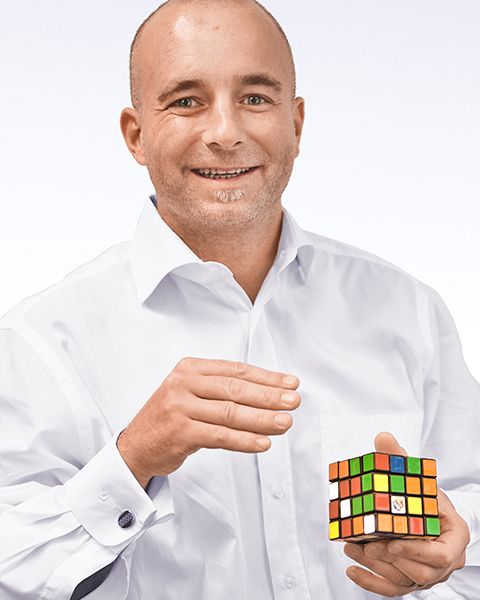Ready for restart thanks to marketing automation
This week, Juri Camagni, CMO of Andreas Messerli AG, talks about his everyday work during this challenging time. Read More

As Head of Sales and manager of a team of around 20 employees, the past few months have held a number of unique challenges for Daniel Wyss. In this interview, he tells us how he managed these challenges and discusses the resulting opportunities he sees for the future.
Like many others, I underestimated the situation at first. I assumed that we would be able to defeat the novel coronavirus and get it under control more quickly. This was followed by a brief state of shock before I quickly switched to problem-solving mode, which is where we remain today.
A number of questions arose for the first time and are still an issue for us today: What does short-time working mean for us and our employees? This was something new for us, and something that resulted in uncertainty for our employees. Or, for example: How can I work together with clients and with my team from home?
It was important for us to move flexibly between different video conferencing platforms. We were already using Skype for Business, which also has a video conferencing function, but there are so many other tools out there: Microsoft Teams, Slack, Zoom, Webex, Google Meet and many more that we needed to master in order to communicate with our clients in particular.
This has influenced my leadership style in that I try to have even more empathy – something that is already important to me under «normal» circumstances. The current uncertainty has forced every employee, myself included, to struggle with dips in morale. It is important to account for these phases of low morale, and to keep this factor in mind when communicating with one another.




«Our employees are now equipped to participate confidently in video conferences with clients.»
I use different modes of communication to stay in close contact with all of my employees, with my managers and with the owner of the company. I have made it my goal to remain in constant contact with all of these individuals via Microsoft Teams, FaceTime, WhatsApp calls or simple phone calls. Video calls have become extremely important for me. They let me establish a sense of closeness despite the physical distance and they make it possible to look the other person in the eyes.
In addition to one-on-one conversations, I also hold a weekly team video call with all of my employees. My experience with this weekly call has been overwhelmingly positive, both in terms of number of participants (essentially 100% of the team) and the involvement of each individual. This is something I will be taking with me going forward. After the pandemic, I will be holding these meetings in person in our conference room, but I will also allow employees to call in via video conference. That way, anyone who is abroad or on-location at a job can also be part of the meeting.
We also benefitted from the fact that we had already installed remote access via VPN some time ago. The new situation meant that some of our less tech-savvy employees had to learn the ins and outs of video conferencing, and now they are equipped to participate confidently in video conferences with clients.
I remain convinced that live interactions are preferable in many situations. This is clear when we look at «public» video conference sessions or webinars, for example, which struggle with a certain lack of engagement. It is easier to leave or log out of a call or a webinar than it is to leave an in-person conversation!
During a period when employees are worried about losing their jobs, personal, face-to-face conversations are extremely important. After all, every employee is a human being – an individual – with individual needs and worries. It is important that we take these needs and worries seriously and address them accordingly. I want my employees to know that my door is always open to them. Naturally, this is easier to express with a physically open door than it is with an online status icon. But I have been positively surprised by how easy it was to manage my team remotely. I will continue to use these «new» tools in the future, and they will play an important role in my day-to-day work.






«Video calls will definitely remain a fixed component of my management strategy.»
First and foremost, it’s important that we all maintain our team spirit without forgetting the needs of each individual employee. In my view, the use of different communication tools has worked quite well to this end, but it remains a major challenge the longer this situation continues.
For me, what is most important is the ability to sense how our clients are feeling and maintain close contact with them. This allows us to demonstrate that we are still here supporting our clients and that we are happy to serve as a sparring partner for them during this difficult time. We want our clients to know that we will be at the ready and excited to get cracking as soon as things really start to pick up! The overwhelmingly positive feedback we have received from our clients is an excellent motivation booster.
But the hope that things will pick up again soon remains our greatest source of motivation. I have to admit that I too have struggled with low morale from time to time. But each one of us holds our own destiny in our hands. That is why it is important to remain positive, even during challenging times, in order to motivate ourselves and, as I mentioned before, to stay in touch with clients.
Once things get back to «business as usual», we will see whether or not certain habits that we have developed or insights that we have gained during lockdown will stick. That is one of the things I’m most excited about – seeing what changes stick with me as well. No matter what, video calls will remain a fixed component of my management strategy!